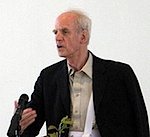By MARK OPPENHEIMER [The Nation] – Like many religious philosophers, [Charles] Taylor sees the foregrounding of earthly life, as opposed to eternal life, as one aspect of modernity. This worries him, because seeing one’s bodily survival and flourishing as the ultimate goal of existence tends toward selfishness. In “A Catholic Modernity?,” my favorite essay in Dilemmas and Connections, Taylor discusses possible alternatives to the culture of earthly life. One alternative comes from Nietzsche, who “rebelled against the idea that our highest goal is to preserve and increase life, to prevent suffering…. Life itself can push to cruelty, to domination, to exclusion, and, indeed, does so in its moments of most exuberant affirmation.” Another alternative comes from Christianity, which, especially in Catholicism, can give license to asceticism, monasticism and other denials of aspects of life.
But Taylor is no Nietzschean, and he does not want to romanticize what we might call Extreme Catholicism. Not only is that premodern Catholicism unrecoverable, Taylor says; it had to expire in order for us to become a more charitable, humane species. Taylor argues that with the Protestant Reformation came an “affirmation of ordinary life” (the term is discussed at length in Sources of the Self) that refocused religious devotion on the daily acts and works of ordinary people while elevating the sufferings of those ordinary people to a matter of divine concern.
In the Catholic world, it was too easy to feel that none of us mattered—all that did matter was present in the church, or the Mass, or heaven. But once it became clear that God was present when you read the Bible, it also became clear that the affairs of those Bible readers mattered to God. Taylor seems to say that Protestantism rescued Catholicism. Modernity gives us horrors, but also graces such as we never knew: “The age of Hiroshima and Auschwitz has also produced Amnesty International and Médecins sans Frontières.” Taylor says that Christianity “needed this breach with the culture of Christendom…for the impulse of solidarity to transcend the frontier of Christendom itself.” Pan-human solidarity, so much a part of our humanity now, is too valuable to lose. So the work at hand is to live with modernity: it’s worth it.
Continued in The Nation | More Chronicle & Notices.






















Post a Comment